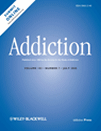Abstract:
Aims: 1) To evaluate the role of pre-existing weakness in working memory ability (WM) as a risk factor for early alcohol use as mediated by different forms of impulsivity. 2) To assess the adverse effects of progressive alcohol use on variations in WM over time.
Design, Setting and Participants: A community sample of 358 adolescents [48% males, Meanage(baseline) = 11.4± 0.87 years] from a longitudinal cohort design, assessed annually over four consecutive years with less than 6% attrition.
Measurements: Repeated assessments were conducted for the following key variables: WM (based on performance on four separate tasks), frequency of alcohol use (AU), and three forms of impulsivity, namely sensation seeking (SS), acting-without-thinking (AWT) and delay discounting (DD). Latent growth curve modeling procedures were used to identify individual trajectories of change for all key variables.
Findings: Weakness in WM (at baseline) significantly predicted both concurrent alcohol use and increased frequency of use over the four waves (p <.05). This effect was entirely mediated by two forms of impulsivity, AWT and DD, both of which were characterized by underlying weakness in WM. No individual variation was observed in the slopes of WM, which suggests that individual variations in alcohol use were not associated with changes in WM in our early adolescent sample.
Conclusions: Early adolescent alcohol use may be a consequence of (pre-existing) weaknesses in working memory (WM) rather than a cause of it. Efforts to reduce early alcohol use should consider the distinct roles of different impulsivity dimensions, in addition to WM, as potential targets of intervention.
Authors
- Laura M. Betancourt
- Nancy L. Brodsky
- Joan M. Giannetta
- Hallam Hurt
- Atika Khurana
- Daniel Romer


